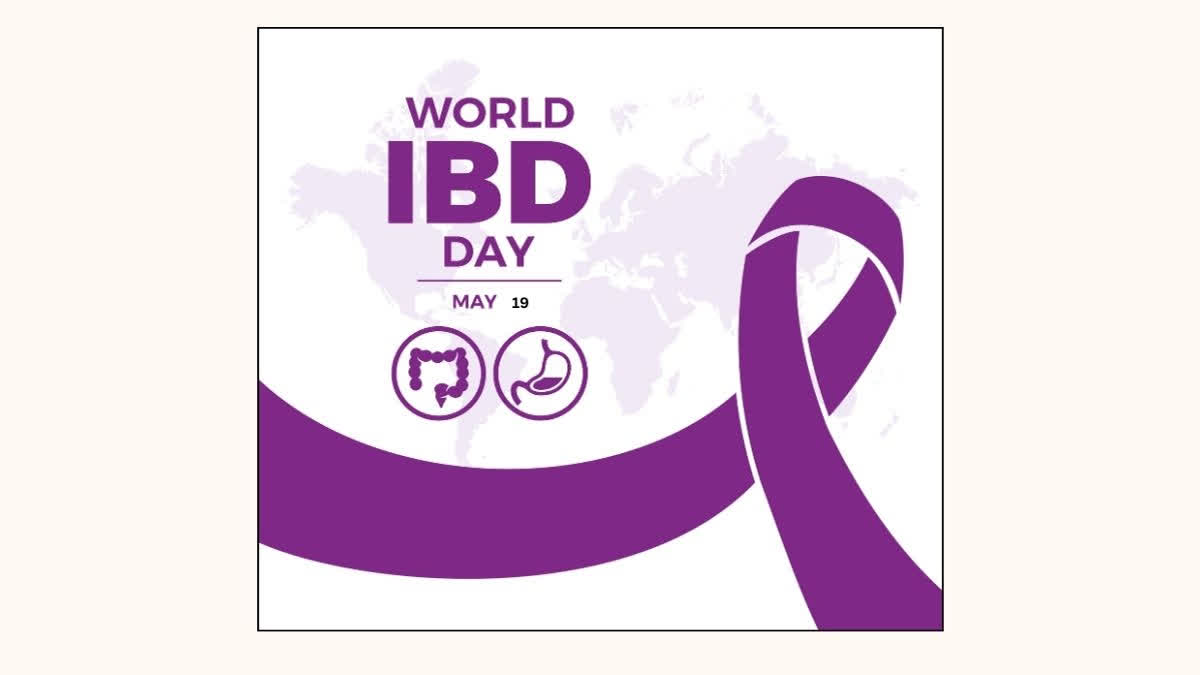New Delhi: To boost the efforts of individuals and organisations working together to create awareness about Inflammatory Bowel Disease (IBD), the World Inflammatory Bowel Disease Day will be observed on May 19. The occasion also unites people worldwide in their fight against these diseases.
What is IBD? Among other IBD diseases Crohn’s disease and ulcerative colitis are two serious, lifelong digestive diseases that affect around five million people worldwide.
Crohn’s disease can cause inflammation anywhere in the gastrointestinal tract from the mouth to the anus. Ulcerative colitis can cause inflammation and ulceration in the large intestine (colon and rectum). The inflammation of the gastrointestinal tract, ulcers, intestinal narrowing can occur in IBD.
What causes IBD? According to America’s national public health agency-Centers for Disease Control and Prevention (CDC) IBD is the result of a weakened immune system. The possible causes that led to IBD includes the immune system responding incorrectly to environmental triggers, such as a virus or bacteria, which causes inflammation of the gastrointestinal tract.
“There also appears to be a genetic component. Someone with a family history of IBD is more likely to develop this inappropriate immune response,” the CDC said.
Renowned gastroenterologist Dr Vivek Raj said IBD is an increasingly common problem. “In fact, both Crohn’s disease and ulcerative colitis are rapidly increasing in India. It affects the younger population mostly of any age group. But the majority of people fall into the 20-40 years age group,” said Dr Raj.
Effects of IBD: IBD can lead to a number of complications, including malnutrition and damage to the bowel. IBD occurs due to an overactive immune system, which leads to inflammation throughout the gut and gastrointestinal tract. IBS usually develops due to digestive problems or an oversensitive gut.
Symptoms: Symptoms of Inflammatory Bowel Disease include abdominal (belly) pain, diarrhea, gas and bloating, loss of appetite or unexplained weight loss, mucus or blood in stool, upset stomach, fatigue, fever, joint pain, nausea and vomiting as well as skin rashes and sores (ulcers).
Prevention: Dr Raj said that it (IBD) is an autoimmune disease. “Although, data does not exactly tell why it is increasing, certain triggers are well known like the family history of IBD,” he said.
“Repeated childhood infection of gastroenteritis protects against IBD. There is a need to have healthy plant-based food rather than processed food and ultra processed food. People should have a plant-food based diet,” said Dr Vivek Raj, HOD-Gastroenterology at the Max Superspeciality hospital at Saket in New Delhi.
He said that IBD can be both mild and severe. “It can lead to bleeding, weakness and weight loss. IBD can change peoples whole lifestyle,” he said.
Organisation Working for IBD patients in India: IBD Patient Support Foundation (India) or IBD India is a prominent non-profit working for the welfare of IBD patients. It was incorporated on September 4, 2021.
“A lot of our time is spent in helping patients access the proper doctors and counsel them about medications, disease complications, diet, lifestyle and other things. We offer free mental health care via a collaboration with another nonprofit, because mental health is a very important aspect of living with a chronic condition like IBD, and research says that people are very much likely to experience anxiety and depression when living with a chronic illness. We also offer financial aid for medication and also help to organise fundraisers for people requiring surgery, etc. We also run many support groups, mainly through Facebook and WhatsApp and we have a women exclusive group, so that they can discuss their problems in a safe atmosphere,” said Nikhil Jayswal, Director, IBD Patient Support Foundation (India).
He said that about 15 lakh people have IBD in India. However, recent research says that the incidence rate is 9 per 100,000. The disease can be considered to be a silent epidemic, he said.
“The Government of India definitely needs to do more to make the public aware and reduce stigma surrounding the disease. It is a disease which is affecting more and more people with increasing urbanisation. Also, a large majority of the patients are young, and they get the disease when they are in school or college or early career stage. Our youth is our most precious asset for development and this disease impacts the youth and because of lack of policy support, stigma, many young lives are being disrupted and the loss is for the entire nation,” said Jayswal.
The Lancet Study: Traditionally, infectious diarrhoea has been the major cause of lower GI symptoms across the developing world. Increasing urbanisation has been implicated for the rising IBD cases despite very limited data in the rural setting.
The Lancet, a global medical journal, conducted a first ever study on IBD in India last year. Of 32,021 patients investigated predominant symptoms were chronic abdominal pain (55 percent), change in bowel habit (45 percent), rectal bleeding (16 percent), chronic diarrhoea (13 percent), un-intended weight loss (9 percent) and anaemia (3 percent).
As per the study, final diagnoses included IBD (5.4 percent ulcerative colitis (UC), 3.2 percent Crohn’s disease, CD), intestinal tuberculosis (1.2 percent), infective colitis (4.6 percent), colorectal cancer (1.6 percent) and polyps (7.7 percent).


